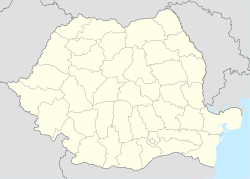Videle
| Videle | ||
|---|---|---|
| Town | ||
|
||
 Location of Videle |
||
| Location of Videle | ||
| Coordinates: 44°17′0″N 25°32′0″E / 44.28333°N 25.53333°ECoordinates: 44°17′0″N 25°32′0″E / 44.28333°N 25.53333°E | ||
| Country |
|
|
| County | Teleorman County | |
| Status | Town | |
| Government | ||
| • Mayor | Lucian Militaru (Democratic Party) | |
| Area | ||
| • Total | 79.96 km2 (30.87 sq mi) | |
| Population (2011) | ||
| • Total | 11,112 | |
| Time zone | EET (UTC+2) | |
| • Summer (DST) | EEST (UTC+3) | |
| Website | http://www.primariavidele.ro/ | |
Videle (Romanian pronunciation: [ˈvidele]) is a town in Teleorman County, southern Romania, with a population of 11,112 in 2011. It was upgraded to town status in 1968 by incorporation of a few villages nearby. Today, Coșoaia is the single associated village the town administers.
Videle is of some importance as a railway junction, for the railway track heading south to Bulgaria leaves the main Walachian East-West-railway from Bucharest to Craiova.
Located adjacent to the main hospital grounds, the local 'Residential Hospital for Incurable Children' gained international notoriety for its appalling conditions and deprivations. These became public following the overthrow of the Ceaușescu government and a damning report by an investigative journalist from The Washington Post in 1990.
...
Wikipedia


